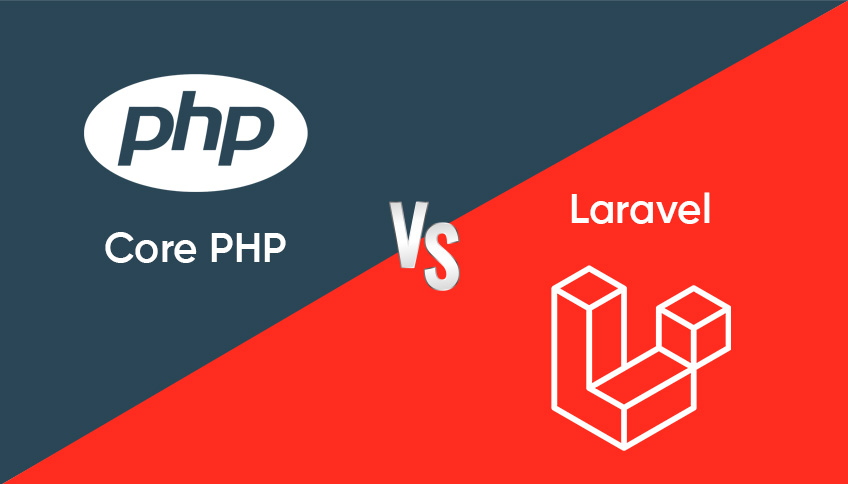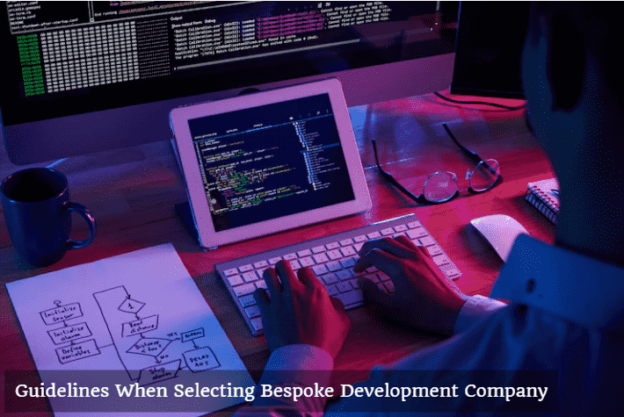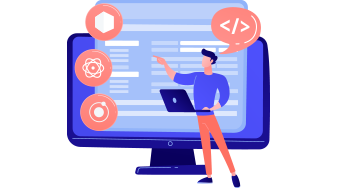Core PHP vs. Laravel comparison is here with all the differences and pointers to be considered for making the right choice.
Core PHP vs. Laravel: Which Is the Superior Choice for Your Web Application Development?
PHP has revolutionized the world of web development right from the initial years of launch. Over the years, it has remained a dominant force as it powers a number of websites as a server-side programming language. This statistic underscores PHP’s enduring popularity, with nearly 8 out of every 10 websites incorporating it into their tech stack. Laravel development company services, on the other hand, has great qualities also that make it a prominent framework. However, the article is going to show a Core PHP vs. Laravel comparison on a number of verticals.
You might wonder why core PHP Vs Laravel i.e. compare a programming language with its own framework. The goal is to uncover the best strategies for effective and swift web development. As newer frameworks like Laravel offer advanced features and improved functionality, they present a significant challenge to Core PHP. So, let’s explore this showdown and determine which option stands out for today’s web development needs.
Core PHP vs. Laravel: A Brief Comparison
Here is a comparison between the two contenders.
- Core PHP is a simple yet powerful programming language used to develop high-performance websites and web applications that run across various browsers. On the other hand, Laravel is a robust PHP-based framework designed for building sophisticated, feature-rich web applications.
- The key difference between Core PHP and Laravel lies in their structure. Core PHP does not follow a predefined architecture, allowing developers complete flexibility but also requiring more manual effort. In contrast, Laravel adheres to the MVC (Model-View-Controller) architecture, promoting well-organized and maintainable code, making it easier to manage larger projects.
- When it comes to development speed, Core PHP can be more time-consuming since it requires building functionalities from the ground up. Laravel, however, offers a wide range of built-in features and tools, such as routing, templating engines, and database management, which streamline the development process and save time.
- Security is another area where Laravel has a clear advantage. It comes with built-in security mechanisms like encryption, Cross-Site Request Forgery (CSRF) protection, and input validation. In Core PHP, developers need to manually implement these security measures, increasing the potential for vulnerabilities if not properly handled.
However, Laravel’s advanced features come with a steeper learning curve, making it more challenging for beginners. Core PHP, being simpler and more straightforward, is easier for novice developers to pick up and work with, especially if they are just starting with basic PHP concepts.
Now let’s have a look at both platform one by one.
Core PHP
Core PHP serves as the foundational programming language behind all PHP frameworks, including Laravel. It empowers developers to build highly dynamic and custom web applications, pushing the boundaries of what’s possible in web development. With its flexibility and control, Core PHP offers a strong foundation for crafting applications tailored to specific business needs.
Several renowned enterprises rely on Core PHP to power their websites and web apps, including WordPress, Etsy, Wikipedia, MailChimp, Slack, Tumblr, and even Facebook. These industry leaders showcase the versatility and reliability that Core PHP brings to large-scale digital platforms.
Outlined below are the key advantages of using Core PHP for your web development projects:
Flexibility
Core PHP is highly “custom-based,” making it an ideal platform for experimenting with innovative ideas and executing solutions that push beyond the limitations of pre-defined frameworks. Its flexibility allows developers to create unique features and functionalities, delivering fresh efficiencies that can directly impact your enterprise’s web development efforts. By bypassing the constraints of structured frameworks, Core PHP opens up opportunities to bring truly original concepts to life, adding tangible value to your business’s digital strategy.
Ease of development
With Core PHP, there’s no need to rely on external libraries, allowing you to build your website or web application without the overhead of additional references. This streamlines the development process, eliminating the restrictive complexities often encountered when working with frameworks. As a result, you have full control over the code, enabling you to create custom, efficient solutions tailored to your specific needs without being bound by the constraints of pre-built components.
Laravel
Laravel features an elegant and expressive syntax that transforms development into a creative and rewarding process. By simplifying essential web development tasks like routing, caching, sessions, and authentication, Laravel enhances the overall development experience without compromising on functionality. It offers a comprehensive set of powerful tools, including inverted control containers, expressive migration systems, and integrated unit testing, empowering developers to build robust applications with ease.
Several prominent enterprises trust Laravel for their websites and web apps, including BBC, Pfizer, 9Gag, AboutYou, Ratio, Crowdcube, and TourRadar. These brands exemplify Laravel’s capability to deliver scalable and high-performance digital solutions.
Libraries
Laravel boasts extensive object-oriented libraries designed to offer a clear and modular structure, making development more streamlined and efficient. These libraries simplify the process of maintaining and modifying applications, ensuring that future updates or changes can be easily implemented. Laravel’s well-organized modular approach not only enhances the scalability of your web applications but also promotes cleaner, more maintainable code over the long term.
Authentication
Laravel offers a well-structured and streamlined authentication system that is both powerful and easy to implement. With built-in features to handle user registration, login, and password management, Laravel simplifies the entire authentication process, allowing developers to integrate secure, efficient authentication mechanisms without unnecessary complexity. This makes it a go-to choice for projects requiring a reliable and straightforward approach to user authentication.
Utilizations for Core PHP and Laravel
Core PHP utilities
-
Enhanced Cybersecurity
PHP development enables the integration of robust cybersecurity protocols into your website or web application, effectively safeguarding against potential cyberattacks. With PHP forming the backbone of your web application, developers can easily detect vulnerabilities and implement the necessary safeguards to prevent security breaches. This proactive approach ensures the protection of sensitive data and minimizes the risk of malicious threats.
-
Customizable Script Codes
Core PHP offers greater flexibility by reducing reliance on third-party email services. PHP’s customizable script codes make it easy for websites to send automated notifications to clients, keeping them informed about important updates. These notifications can also double as sales tools, delivering key messages about new products and services, enhancing customer engagement and driving conversions.
-
CMS Systems
Content management systems (CMS) are essential for businesses looking to maintain a dynamic online presence. PHP-powered solutions make it simple to create, manage, and update content, allowing businesses to align their messaging with their target audience’s needs. This ease of content management ensures that your website remains current and relevant to your users.
Laravel utilities
-
Custom Applications
Laravel development empowers the creation of a wide range of custom web applications tailored to meet the specific needs of both large enterprises and small businesses, as well as their target audiences. These applications are not only fast and efficient but also provide flexibility in functionality. One of Laravel’s standout features is its Blade templating engine, which allows front-end developers to deliver highly impactful and visually appealing results, further enhancing the user experience.
-
MVC Architecture
While Core PHP’s modular structure works adequately, Laravel’s MVC (Model-View-Controller) architecture elevates development by offering superior performance and organizational capabilities. This architecture is particularly beneficial for large projects with extensive, unstructured code, as it simplifies coding structure, improves readability, and streamlines workflows. The result is a more efficient development process and an application that is easier to manage and scale.
-
App Testing
Laravel development comes with built-in testing features, allowing developers to perform both unit and feature testing using PHPUnit. Unit tests focus on small sections of code, while feature tests ensure the functionality of larger codebases. Laravel’s ability to run multiple unit tests simultaneously ensures that any new changes are thoroughly vetted, resulting in a high-performing, bug-free application. This comprehensive testing process contributes to the overall reliability and stability of your web application.
In Conclusion
As per the comparison shown here, it may seem that Laravel is winning against services offered by PHP development company; However, the battle goes beyond just these pointers shown here. In Core PHP vs. Laravel, the one that is suitable for you depends upon the precise requirements. However, choosing the right platform will always be ideal if project requirements are kept in mind.














